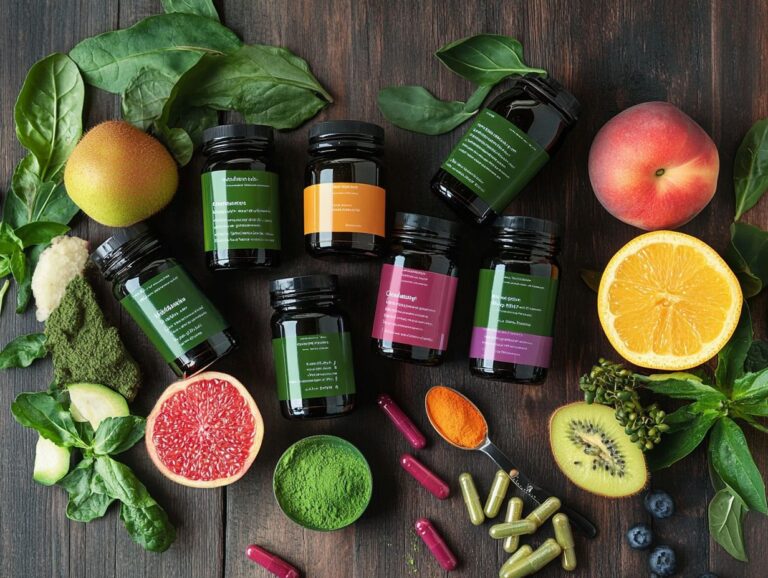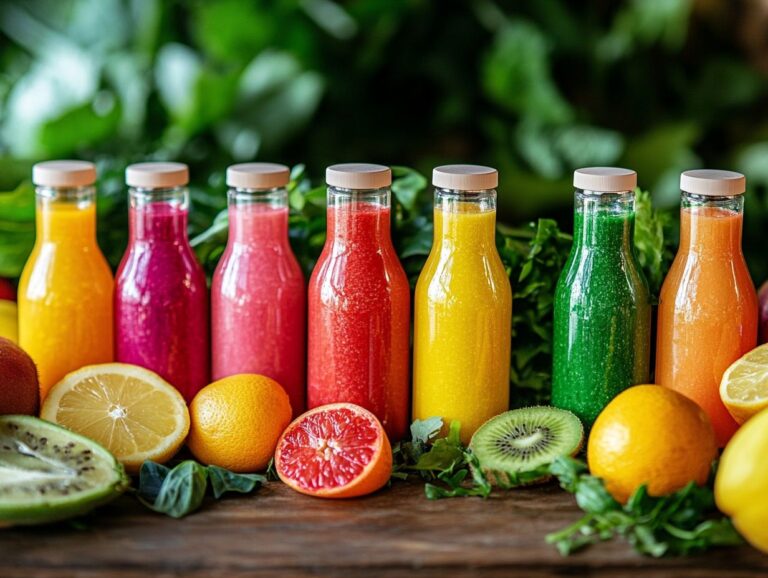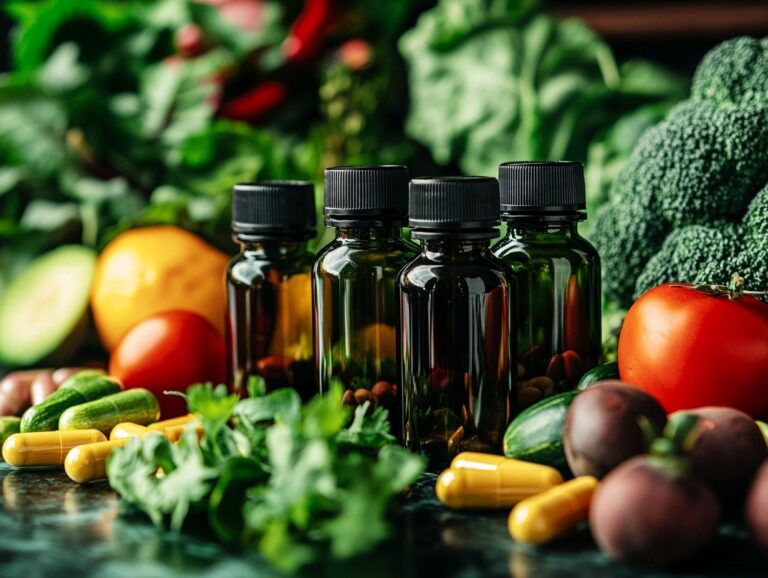Embracing a vegan lifestyle offers numerous health benefits, but it also comes with the responsibility of ensuring that you meet your nutritional needs. Understanding which vitamins are essential for vegans is crucial for maintaining optimal health. This guide explores vital nutrients, including Vitamin B12, which is often lacking in plant-based diets, as well as the importance of Omega-3 fatty acids. Additionally, it will discuss how to incorporate these vitamins into your diet and the potential risks associated with deficiencies. If you are committed to a vegan diet, this information will help you navigate your way toward a balanced and healthy lifestyle.
Why Do Vegans Need to Pay Attention to Their Vitamin Intake?
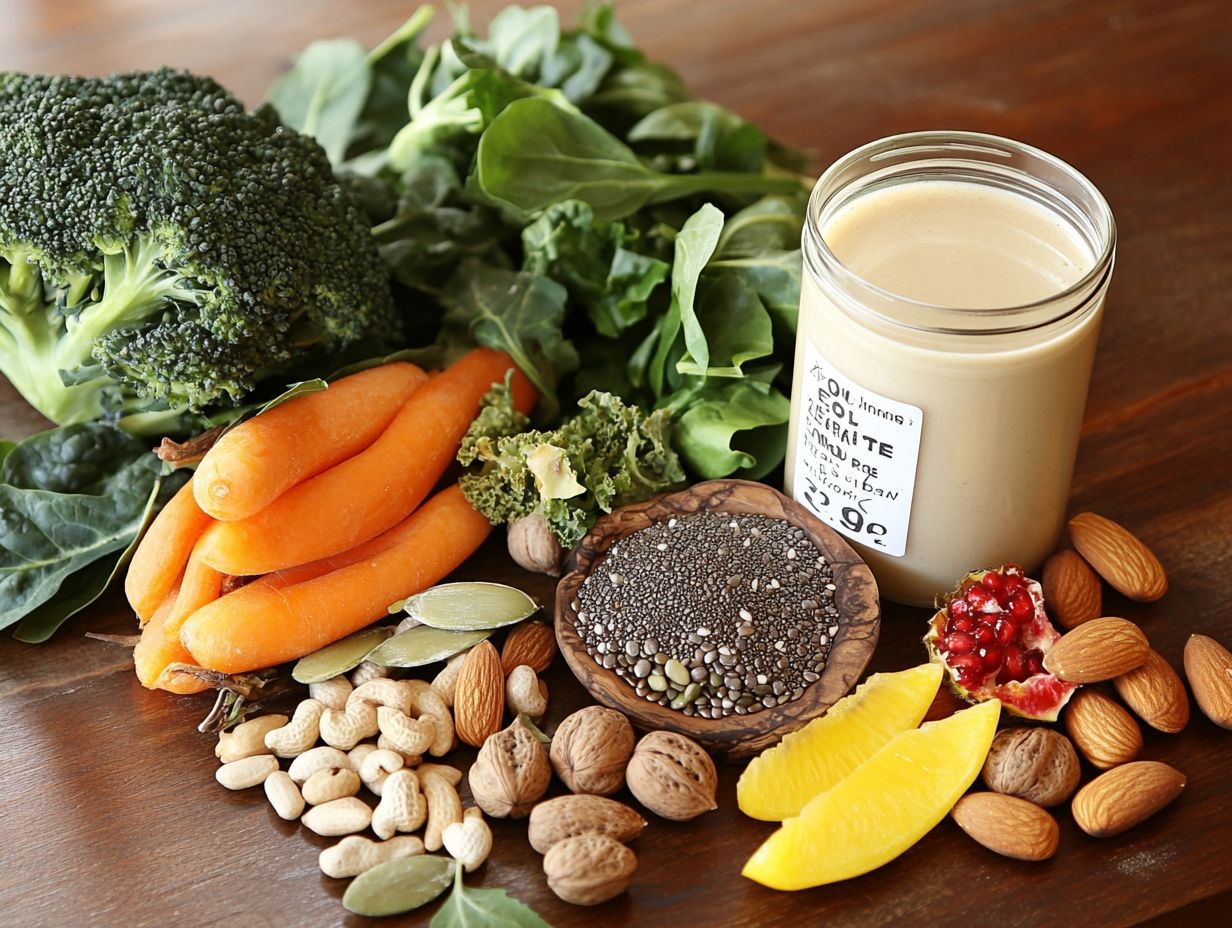
Vitamins are crucial for vegans because essential nutrients such as vitamin B12, vitamin D, calcium, iron, zinc, omega-3 fatty acids, and selenium may be lacking in a plant-based diet.
These nutrients are vital for overall health and can help prevent several common deficiencies experienced by individuals who do not consume animal products.
Understanding the importance of these vitamins is essential for maintaining a vegan lifestyle, as they play a significant role in a varied and balanced diet that supports healthy bones, proper cognitive function, and a healthy weight.
What Are the Essential Vitamins for Vegans?
Essential vitamins for a vegan diet include vitamin B12, vitamin D, calcium, iron, omega-3 fatty acids, and zinc.
These nutrients are crucial for overall health, and individuals following a plant-based diet may be at risk of nutrient deficiencies if they do not consume them in adequate amounts.
1. Vitamin B12
Vitamin B12 is a crucial nutrient for vegans, as it plays an essential role in the proper functioning of the nervous system, the formation of red blood cells, and DNA production. Since B12 is almost exclusively found in animal products, individuals following strict vegan diets are at risk of B12 deficiency unless they consume adequately fortified foods or take nutritional supplements containing the vitamin.
The primary function of vitamin B12 in the body is to assist in DNA synthesis and red blood cell formation. A deficiency in B12 can lead to various serious medical conditions, including anemia, neurological disorders, and irreversible cognitive decline.
To meet the average daily requirement of 2.4 micrograms of B12, adults can consume a combination of fortified foods, such as plant-based milks, breakfast cereals, and nutritional yeast. The consequences of B12 deficiency include:
- Anemia: B12 is necessary for producing red blood cells that carry oxygen throughout the body. A lack of B12 can result in megaloblastic anemia, characterized by the production of large, immature red blood cells that are inefficient at transporting oxygen.
- Neurological Disorders: B12 is essential for maintaining the myelin sheath, which protects nerves. A deficiency can result in neurological symptoms such as numbness, tingling, balance problems, and cognitive decline.
- Cognitive Decline: Studies have indicated that low B12 levels are associated with cognitive decline and an increased risk of dementia.
It is important for vegans to regularly monitor their B12 levels through blood tests and to be aware of the symptoms of deficiency. With proper dietary planning, knowledge of available supplements, and awareness of the potential health consequences of inadequate intake, vegans can maintain healthy B12 levels and ensure a balanced nutritional profile.
2. Vitamin D
Vitamin D is crucial for vegans because it aids in the absorption of calcium and the maintenance of healthy bones. However, obtaining adequate vitamin D can be challenging without sun exposure or the consumption of fortified foods.
In plant-based diets, sources of vitamin D are limited, prompting many individuals to consider supplements or to increase their intake of fortified plant-based milk and other fortified foods.
This fat-soluble vitamin is essential for proper immune function, muscle function, and overall well-being. Vegans cannot access food sources of vitamin D found in animal products, such as fatty fish and liver.
Additionally, geographical location and lifestyle factors can significantly affect one’s ability to synthesize vitamin D from sunlight, particularly during the winter months or for those who spend considerable time indoors.
Insufficient levels of this nutrient can lead to serious health issues, including weakened bones, an increased risk of fractures, and a heightened risk of certain diseases, making proactive dietary choices essential.
3. Iron
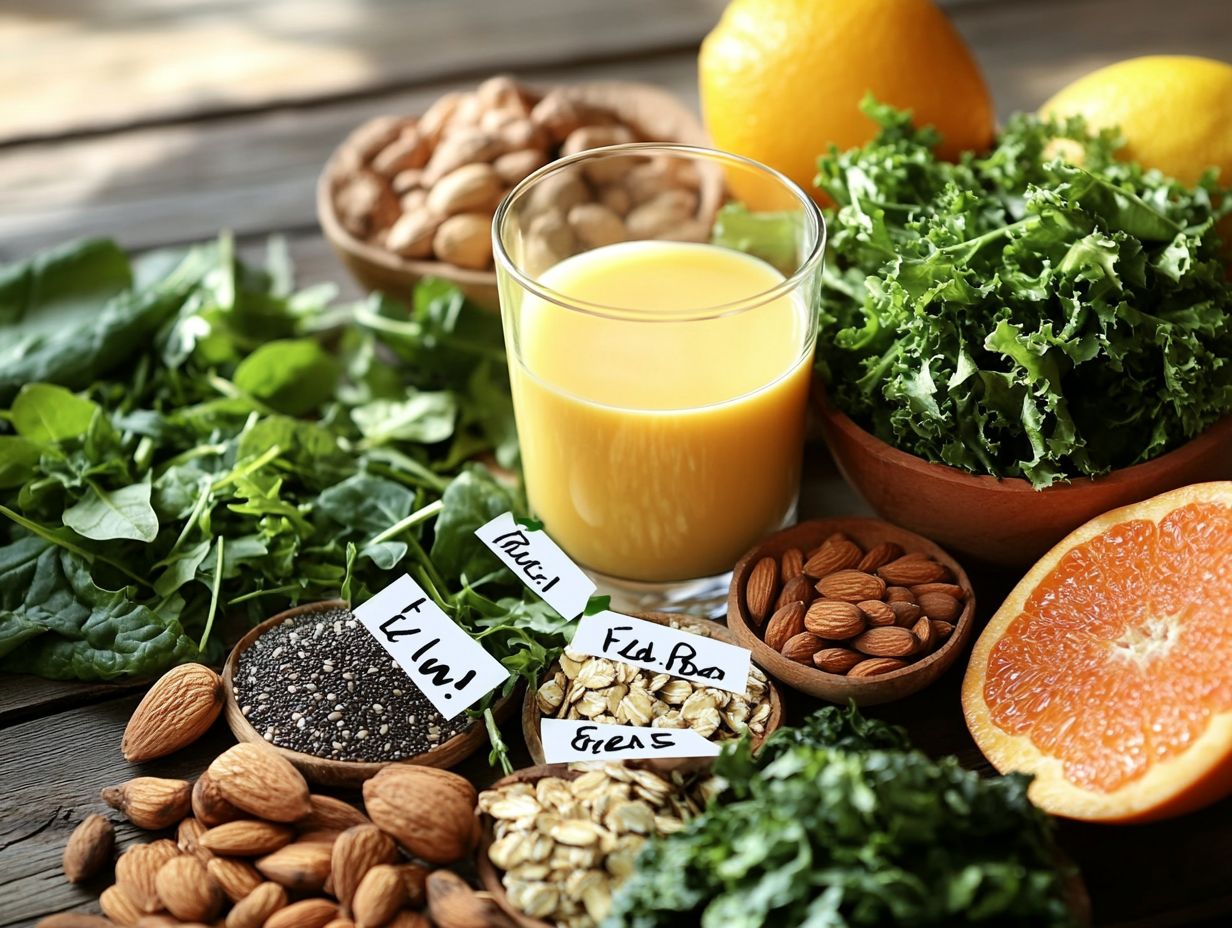
Iron is an essential mineral for vegans, playing a vital role in transporting oxygen in the blood and preventing fatigue. However, obtaining adequate amounts of iron from a vegan diet can be challenging.
This difficulty arises mainly from the presence of two types of dietary iron: heme and non-heme. Heme iron, which is predominantly found in meat and fish, is absorbed by the body much more efficiently than non-heme iron. Non-heme iron is present in plant foods such as lentils, chickpeas, spinach, and fortified cereals, but it is less efficiently absorbed.
To enhance iron intake, it is crucial for those following a vegan lifestyle to include foods rich in vitamin C, such as citrus fruits, bell peppers, and broccoli, as these can significantly improve iron absorption.
If left unaddressed, iron deficiency may lead to anemia, fatigue, weakened immune function, and a range of other health complications, making it imperative for vegans to be mindful of their dietary choices.
4. Calcium
Major calcium-rich foods suitable for vegans include fortified plant-based milk, leafy vegetables, and various other fortified foods. Calcium is essential for maintaining strong bones and teeth. Since dairy products are the most common sources of calcium, vegans must ensure they obtain adequate amounts from alternative sources. Fortified foods can be particularly beneficial in meeting calcium needs and promoting bone health.
Here are some calcium-rich vegan foods that provide significant amounts of this essential mineral:
- Firm Tofu (prepared with calcium sulfate, 1/2 cup): 434 mg (43% Daily Value)
- Almonds (1 oz): 76 mg (8% Daily Value)
- White Beans (raw, 1 oz): 36 mg (4% Daily Value)
- Kale (raw, 1 cup): 94 mg (9% Daily Value)
- Broccoli (raw, 1 cup): 43 mg (4% Daily Value)
- Unsweetened Almond Milk (fortified, 1 cup): 450 mg (45% Daily Value)
- Fortified Orange Juice (1 cup): 500 mg (50% Daily Value)
- Unsweetened Rice Drink (fortified, 1 cup): 350 mg (35% Daily Value)
- Baked Potato (with skin, 1 medium): 56 mg (6% Daily Value)
(Source: USDA FoodData Central)
According to the National Institutes of Health, the general recommended intake of calcium for most adults is approximately 1,000 mg per day. To achieve this goal, it’s important to include calcium-rich foods in daily meals. Consuming foods high in calcium along with vitamin D can enhance absorption, helping vegans reach optimal levels of this vital mineral.
Additionally, regular consultations with a nutritionist can assist in tailoring food options to meet individual dietary needs and improve diet profiles. Including a variety of calcium sources, iron sources, zinc sources, and omega-3 sources, such as leafy vegetables, broccoli, pulses, and chia seeds, can enhance nutritional intake.
5. Omega-3 Fatty Acids
Omega-3 fatty acids are essential for cardiovascular and cognitive health, and vegans should be mindful of their intake, as these fatty acids are primarily found in fish. However, a healthy vegan diet can still include omega-3s by incorporating plant-based sources such as chia seeds, flaxseeds, walnuts, and algae-based supplements. Consuming a variety of fruit vegetables and nuts, including almonds and Brazil nuts, can further support a healthy eating plan.
Vegans can easily incorporate these sources into their daily meals. For instance, a tablespoon of ground flaxseed contains 2.35 grams of ALA and can be added to smoothies or oatmeal. Additionally, a handful of nuts and seeds can enhance salads or be enjoyed as healthy snacks.
Omega-3 supplements derived from algae provide vegans with a direct source of DHA and EPA, the most beneficial forms of omega-3s. Good meal planning and experimenting with new recipes can help vegans ensure they consume an adequate amount of omega-3 fats.
How Can Vegans Get These Essential Vitamins?
Vegans can obtain essential vitamins through a combination of fortified foods, nutritional supplements, and plant-based sources.
Fortified plant-based foods, such as various plant-based milks and soy drinks, are particularly beneficial for vegans seeking to acquire vitamins D and B12.
Nutritional supplements can also play a crucial role in meeting vitamin requirements that are challenging to fulfill through food sources alone.
Additionally, a diverse range of non-fortified, nutrient-dense foods, including leafy greens, nuts, and seeds, is important for overall dietary needs.
1. Fortified Foods
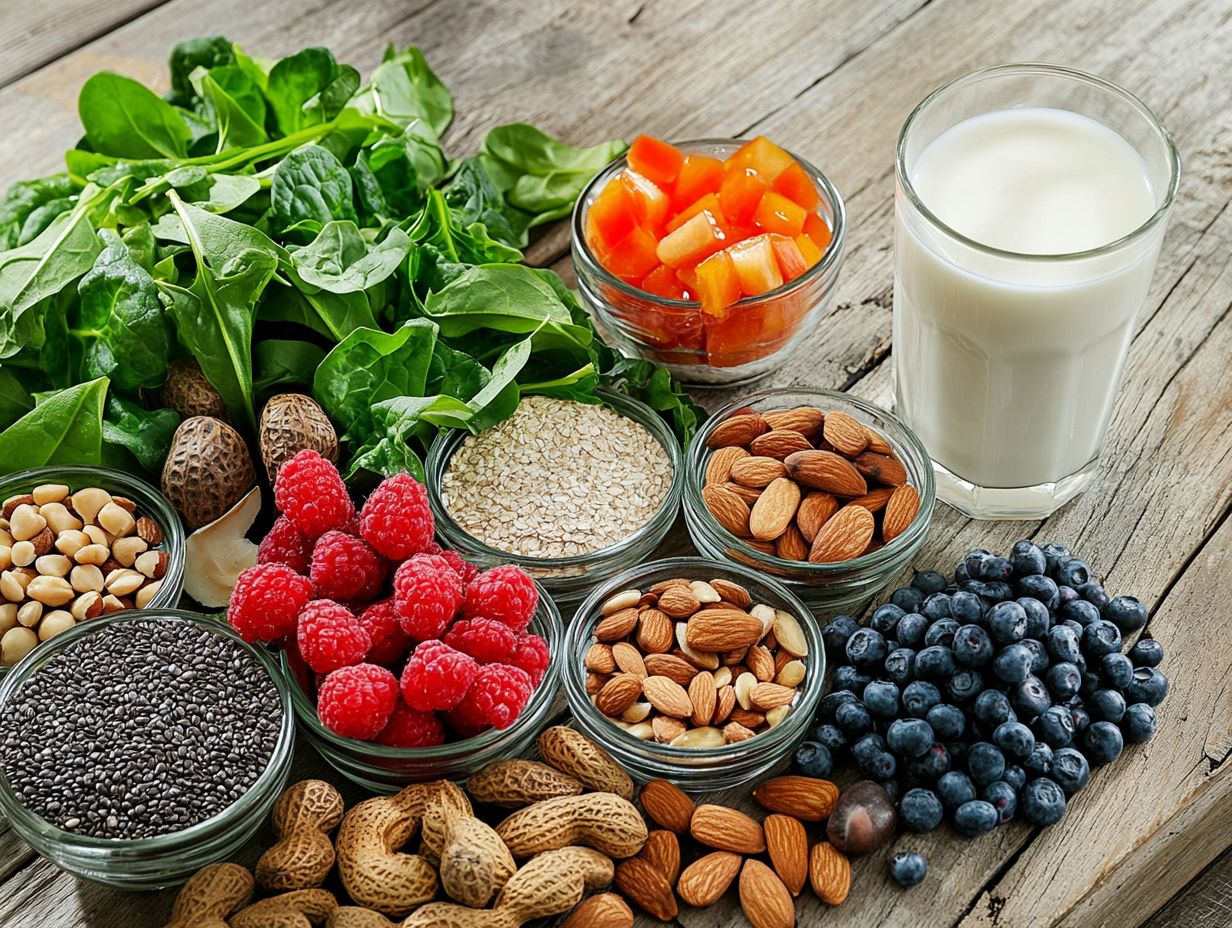
Fortified foods play a crucial role in a vegan diet by providing essential nutrients that are often lacking in a typical plant-based diet, such as vitamin B12, vitamin D, and iodine, which are highlighted in the Eatwell Guide.
Many brands offer fortified versions of plant-based milks, breakfast cereals, and nutritional yeast, making it easier for vegans to incorporate these key nutrients into their meals.
These fortified foods contribute to overall health, support immune function, and help prevent deficiencies that could lead to long-term health issues.
For example, fortified plant-based milks often contain added calcium, vitamin D, and iodine to promote bone health, while breakfast cereals may be enriched with iron, B vitamins, and vitamin B12, which are important for energy production and cognitive function.
By choosing fortified food and beverage options thoughtfully, vegans can meet their dietary needs without consuming animal products, which is why items like nutritional yeast, often fortified with B12, and fortified milk options rich in vitamin D and iodine, are particularly popular within the vegan community.
2. Supplements
Nutritional supplements can provide an effective way for vegans to obtain adequate amounts of essential nutrients such as vitamin B12, omega-3 fatty acids, and zinc. While whole foods should always be the primary source of nutrients in a healthy vegan diet, following guidelines like the Eatwell Guide can help ensure a varied balanced diet, and supplements can help fill the gaps and prevent deficiencies that may arise from dietary restrictions.
Vegans should be aware that certain nutrients are either less abundant or not as easily absorbed from plant sources. This is where supplements become beneficial, offering options such as algae-based omega-3 capsules and fortified plant milks.
The variety of available supplements allows individuals to tailor their intake to meet their specific dietary needs. It is crucial to consult with healthcare professionals regarding supplement use, as they can provide guidance on appropriate options, dosages, and monitoring of nutrient levels.
This approach ensures that individuals following a vegan diet can achieve optimal health by supplementing with the right nutritional inputs.
3. Plant-Based Sources
Diverse plant foods are abundant and essential for meeting the nutritional requirements of vegans. Leafy greens, pulses, nuts, and seeds offer a wide range of nutrients that contribute to a varied balanced diet. Incorporating a variety of these foods into daily meals is crucial for maintaining good health and overall well-being, and can be complemented with dried fruit and Brazil nuts for additional benefits.
Here are some examples of how different plant foods fulfill specific nutritional needs:
- Leafy greens, such as kale and spinach, are rich in iron and calcium.
- Legumes, like lentils and chickpeas, provide high levels of protein and fiber.
- Nuts and nut butters, including almonds and peanut butter, supply energy and healthy fats, along with micronutrients such as vitamin E and magnesium.
- Seeds, such as sunflower and chia seeds, offer healthy fats and energy, as well as essential micronutrients like iron and copper.
What Are the Potential Risks of Vitamin Deficiencies in Vegans?
Vegans may face potential risks from vitamin deficiencies that can lead to serious health problems, including anemia, weak bones, cognitive decline, and an increased risk of cardiovascular disease.
These nutrient deficiencies can arise from the absence of essential vitamins in a plant-based diet. Therefore, it is crucial for vegans to be proactive in monitoring their nutrient intake and to ensure they consume a balanced variety of foods that will support their overall health.
1. Anemia
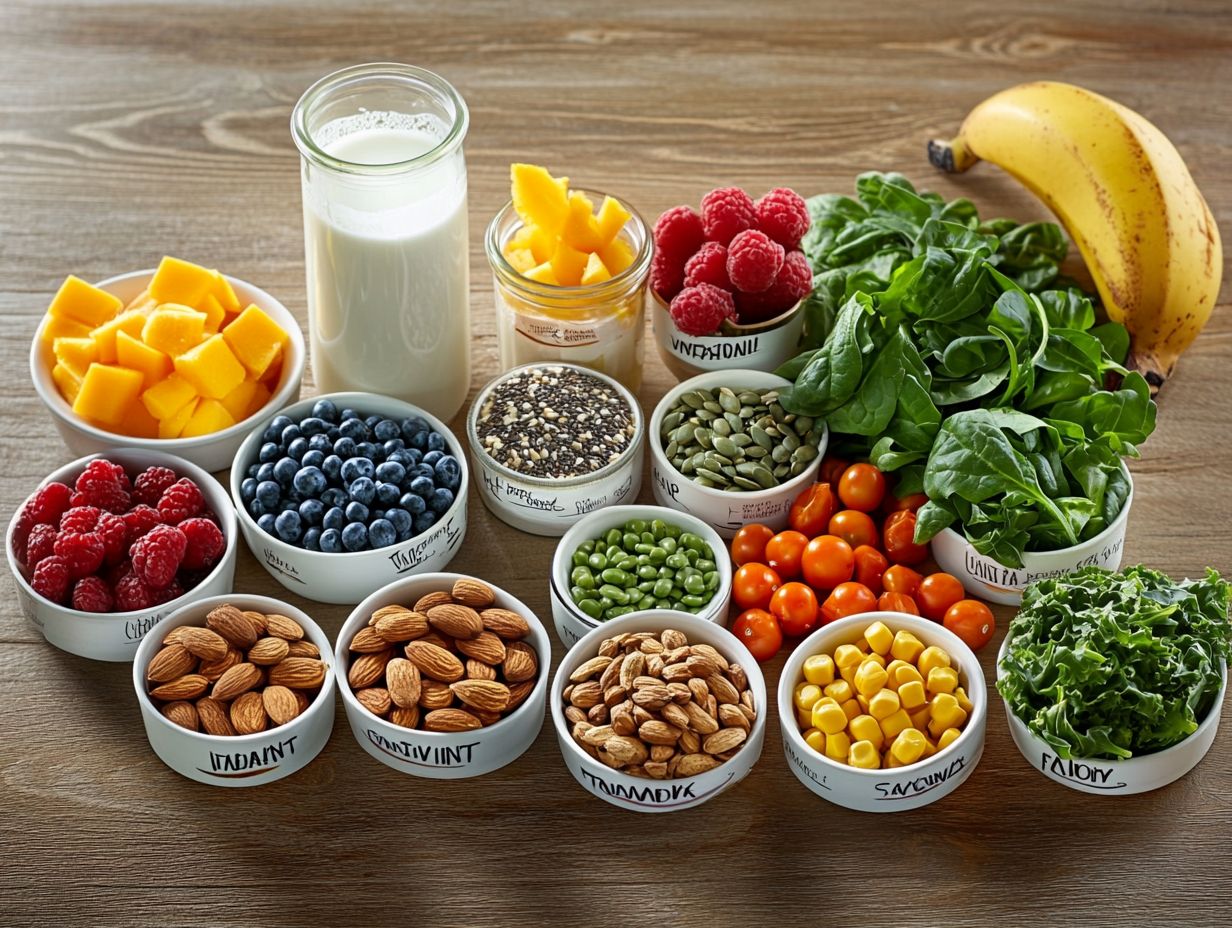
Anemia is a common health risk among vegans, primarily due to low iron levels necessary for the production of red blood cells. Plant-based sources of iron are less bioavailable than those from animal products, making vegans more susceptible to anemia caused by inadequate dietary iron.
This condition can significantly reduce quality of life and overall well-being, leading to symptoms such as fatigue, weakness, and pale skin.
To prevent anemia, individuals following a vegan diet should incorporate iron-rich foods, such as:
- lentils
- chickpeas
- fortified cereals
Additionally, consuming foods high in vitamin C, such as citrus fruits and bell peppers, alongside iron-rich foods can greatly enhance iron absorption. Reducing the intake of calcium-rich foods during these meals may also improve the body’s ability to utilize the available iron.
With proper dietary management, vegan diets can effectively prevent or mitigate the severity of health risks associated with iron deficiency anemia.
2. Weak Bones
One potential risk of following a vegan diet is weak bones, which can result from deficiencies in essential nutrients such as calcium and vitamin D that are vital for maintaining bone density and strength.
Without adequate intake of these nutrients, individuals on a vegan diet may face a higher risk of developing osteoporosis and fracturing bones in the future. Bone health is crucial not only for mobility but also because bones serve as the structural foundation of the body, protect vital organs, and store essential minerals.
Vegans can mitigate these deficiencies by consuming fortified foods and supplements, including plant-based alternatives rich in calcium, such as:
- Fortified plant milks
- Leafy greens
- Almonds
Additionally, exposure to sunlight is important for boosting vitamin D levels, which can be challenging to obtain from a strict vegan diet. Engaging in regular weight-bearing exercises can also help enhance bone strength and density, thereby supporting the body’s framework and promoting long-term health.
3. Cognitive Decline
Cognitive decline is a potential consequence of nutrient deficiencies that are often observed in vegans, particularly those related to vitamin B12 and omega-3 fatty acids, both of which are vital for brain health.
Deficiencies in these nutrients can impair cognitive function and may increase the risk of neurodegenerative diseases over time. Recognizing the signs of cognitive decline, such as memory impairment, difficulty concentrating, or changes in mood, is crucial for early intervention.
For individuals following a plant-based diet, strategic planning is essential to ensure adequate intake of vitamin B12, as its deficiency can lead to neurological issues, including nerve impairment and memory problems. Incorporating fortified foods or supplements may play a significant role in preventing these deficiencies.
Omega-3 fatty acids are also crucial for neurological health, so including sources like algae oil or flaxseeds is essential. A balanced approach can help strengthen the cognitive reserve of vegans and enhance their overall cognitive capacity.
4. Cardiovascular Disease
Cardiovascular disease can pose a potential risk for vegans if they do not consume sufficient essential nutrients, particularly omega-3 fatty acids, which are vital for maintaining good heart health. A deficiency in these nutrients can lead to increased inflammation and other risk factors associated with cardiovascular disease, underscoring the importance of proper dietary planning for those following a vegan lifestyle.
Therefore, it is essential for vegans to include sources of omega-3 in their diets, such as:
- Flaxseeds
- Chia seeds
- Walnuts
Omega-3 algae supplements are also a valuable option, as they provide DHA and EPA, the most biologically active forms of omega-3.
By recognizing nutrient deficiencies that elevate the risk of cardiovascular disease, individuals can take preventive measures to support their heart health while adhering to a vegan diet. Regular check-ups and consultations can help ensure that these diets remain balanced and nutritious.
Tips for Ensuring a Balanced Vegan Diet
A balanced vegan diet necessitates healthy eating habits that emphasize variety to ensure the consistent inclusion of all essential nutrients.
This approach helps prevent nutrient deficiencies, promotes a high quality of life, and allows vegans to thrive on their chosen diet.
